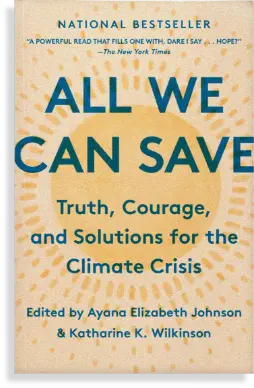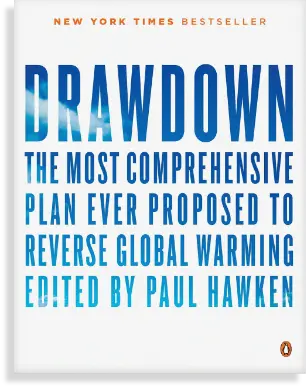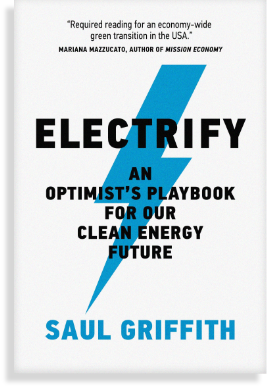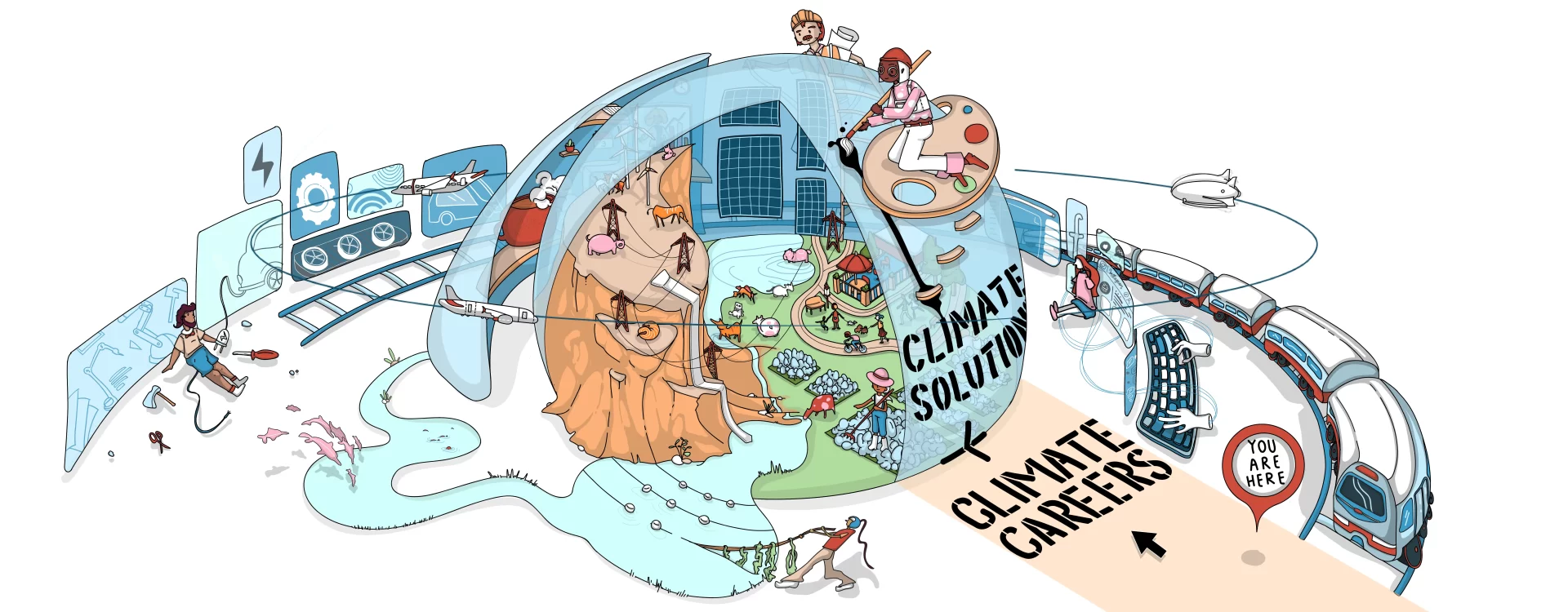
Finding Your Role in the Climate Fight
This is an all-hands-on-deck moment in history. Every ton of CO2 that we keep out of the atmosphere in the next thirty years, every fraction of a degree of warming that we prevent, will mean that the centuries to come are full of less death and suffering, fewer injustices borne by the most vulnerable among us, and fewer species with which we share the earth driven to extinction.
This website is for anyone who feels living at this moment as a weighty responsibility – or as a tremendous privilege – and wants to find a way to use the incredible leverage that they have, just by being alive right now, to make the world
better,
more just,
more full of life.

How to use this site
This website comes in two parts. The part on CLIMATE SOLUTIONS is for anyone who wants to wrap their head around what we need to do together to solve climate change. The part on CLIMATE CAREERS is aimed especially at students who want to find a career path that will let them contribute to the fight against climate change and for environmental justice. It’s also for anyone who wants to shift careers, or figure out how to use their existing career to address climate change.
I. Climate Solutions
The part of the site on CLIMATE SOLUTIONS provides a systematic guide to what we need to do, and how the pieces all fit together. The pull-down menu at the top of the page is the easiest way to navigate this side of the site. We recommend that you start with this part of the site, even if you’re here for the part on climate careers. Once you finish reading the current page, begin with the Climate Solutions Overview page, and then progress to the page called Energy: The Big Picture. From there, you can go on to any of the sub-sectors under energy, or other sectors like Agriculture, Forestry + Land Use. On each solutions page you’ll find an overview and a curated set of readings and podcasts, accessible to a reader without any technical background. (Most of the links are just recommendations. But the links with arrows [⇒] pointing to them are especially valuable and important. You should think of these as an essential part of the site. Click on them, don’t scroll past!)
You’ll see that we already have many of the technologies and practices we need in order to fight climate change; the trick is overcome the obstacles to deploying them, rapidly and at scale. But there are also important areas where we still need to develop new technologies. We need to be able to make steel and cement without burning coal or fossil gas, for instance, and we need to power airplanes and ships without burning oil. A lot of the exciting work of inventing these climate solutions is being done by scientists, engineers and entrepreneurs in the growing ecosystem of “ClimateTech” startup companies. So, at many points in the site, you’ll see embedded databases of startups working to develop climate solutions in some specific sector. For example, here are some startups working on ways to decarbonize shipping and boating:
| Name | Description | Media |
|---|---|---|
| Fleetzero | Battery-electric cargo ships | My Climate Journey |
| NorsePower | Mechanical rotor sails for large ships that help save on fuel and emissions | CleanTechnica |
| Nautilus Labs | Ship routing for fuel savings | Canary Media |
| WasteFuel | Produces bio-methanol for shipping from a variety of waste sources including landfill gas and biogas using anaerobic digestion. | LA Business Journal |
| Seabound | Carbon Capture and Storage (CCS) for large cargo ships | My Climate Journey |
| X Shore | Electric small boats | Forbes |
| Amogy | Ammonia-based fuels for maritime transport | My Climate Journey |
| Flux Marine | All-electric outboard propulsion systems for recreational boating | My Climate Journey |
| Candela | Electric hydrofoil technology for boat and vessel motors | Wired |
| CarbonRidge | CCS for large cargo ships | |
| Sofar | autnomous buoys provide weather forecasting, datasets, route opitimization | Forbes |
Be sure to scroll down within the embedded database to see companies that don’t appear in the visible window. The startups we’ve included are only a sampling of the many startups in each of the areas we cover. If you’re interested in some sector, we recommend exploring the startups working in it. The link in the right-hand column of each company’s entry is to a podcast or an article explaining in more depth what that company does. Listening to or reading these, you can often learn a lot more than you can from a company’s website.
At the bottom of most pages, you’ll find some links to more detailed resources, including more technical ones.
II. Climate Careers
Because climate change will touch every aspect of life on this planet, the range of careers that can help to address it is almost inconceivably wide. The part of the site on CLIMATE CAREERS is meant to broaden your imagination by offering a tour of a few of the many impactful possibilities. Some of these are things that jump to mind when you hear “climate career:” we need organizers working to move the political system, and scientists and engineers of all kinds, inventing and building out the renewable energy and other technology solutions that we discuss in the part of the site devoted to CLIMATE SOLUTIONS. But the world also needs artists and poets and television writers, to convey what this moment demands and what a better world could look like; it needs regenerative farmers and aquaculturalists, to transform the way we grow our food, so that the earth and the oceans remain sinks for greenhouse gasses, rather than emitting more; it needs architects and urban planners to design buildings and cities that make it easy for people to live climate-positive lives; entrepreneurs and financiers to build and fund an economy that is circular, rather than extractive; psychologists to help people cope with the climate anxiety and climate grief that our changing climate is already bringing. Whatever your talents, skills, and interests, there’s a place for you in the climate fight.
Here’s a diagram:
(Borrowed with modification from Dr. Ayana Elizabeth Johnson)
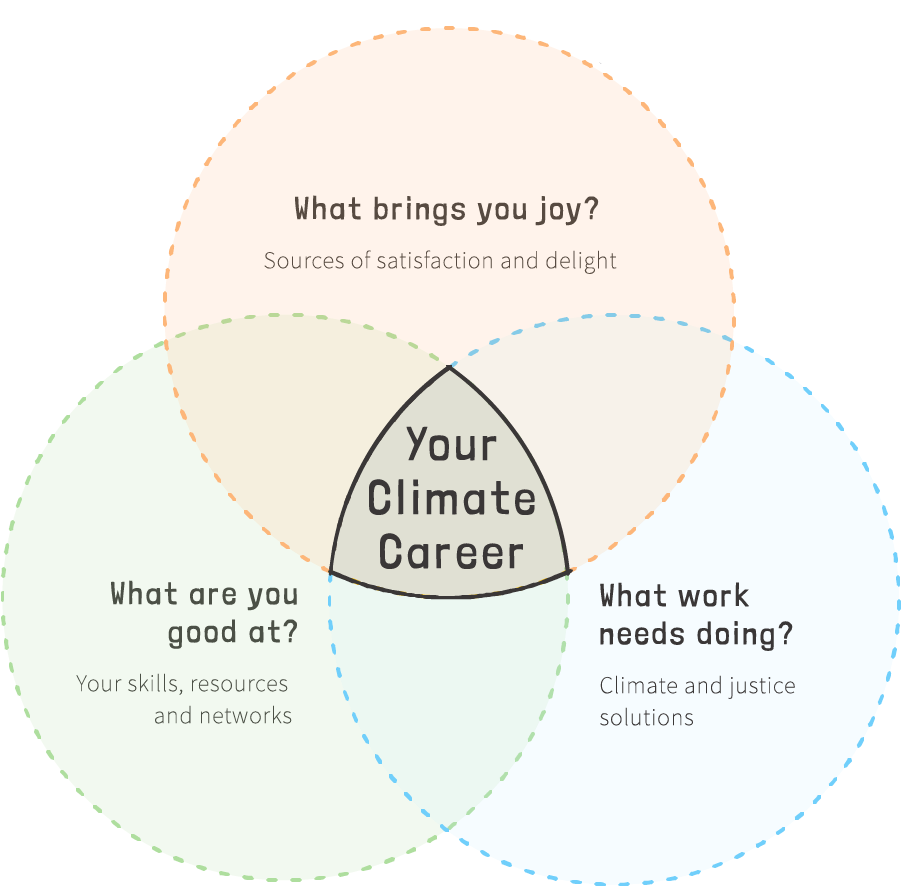
Take a moment, and write down on a sheet of paper what you’re good at – your skills and talents; and write down a list of activities that bring you joy – things that make you want to get out of bed in the morning. You can use the two parts of this website – CLIMATE SOLUTIONS and CLIMATE CAREERS – together to fill in the third circle: work that needs doing.
Three Essential Books
In addition to linking to online articles and podcasts, this site makes constant reference to readings from three wonderful, essential books.
If you’re interested in climate solutions or climate careers, you should get these from your local library, or buy them. You can read through them in one go, or use them as companions as you explore this website.
Before you begin: Reckoning with your feelings
Climate change threatens so much: people, of course (especially the poorest, most marginalized people on the planet, who are least responsible for the problem), but also innumerable animals, plants, and ecosystems with which we share the planet, and which make the earth a beautiful home for humanity. So, thinking about climate change can evoke powerful, sometimes overwhelming feelings – of fear; of anger; of anxiety; of grief. There is nothing wrong with feeling any of these – indeed, the situation we’re in might call for them. But they can be overwhelming, and debilitating. Rather than trying to ignore these feelings, spend some time now reckoning with them before you begin your journey, and allow yourself to keep returning and working with them as your journey progresses. These wonderful essays, from All We Can Save and online, can help:
- Ash Sanders, “Under the Weather,” All We Can Save, pp. 231-247
- Amy Westervelt, “Mothering in an Age of Extinction,” All We Can Save, pp. 249-254
- Emily Johnston, “Loving a Vanishing World,” All We Can Save, pp. 256-265
- Susanne C. Moser, “The Adaptive Mind,” All We Can Save, pp. 270-278.
- Mary Annaïse Heglar, “Home is Always Worth It,” All We Can Save, pp 279-283.
- Ayana Elizabeth Johnson and Katherine K. Wilkinson, “Onward,” in All We Can Save, pp. 371-4.
- Kate Marvel, “We Need Courage, not Hope, to Face Climate Change”
- Ezra Klein, Your Kids are Not Doomed
Resources
The economics, politics, and technology of climate change are all changing fast. One of the best ways to come up to speed and then stay up to speed is to subscribe to a few of the many great newsletters and podcasts devoted to the climate fight.
Here are four e-mail newsletters that are good for everyone, whatever your more specific interests. We recommend all of these highly!
- Heatmap Daily is a newsletter from Heatmap News, a brilliant new platform devoted to the politics, policy, and technology of the energy transition and the broader climate fight. The newsletter itself is free, but the news site is not. If you’re a student or educator, you can subscribe to the news site for $5 per month.
- Canary Media daily newsletter provides extremely strong coverage of climate technology and the energy transition. It is the best complement to Heatmap News. Both the newsletter and the Canary Media news site are free.
- The Crucial Years newsletter by Bill McKibben is free. McKibben has been a leading climate activist for more than 30 years. He wrote one of the earliest influential books on climate change, The End of Nature, in 1989, and he founded the group 350.org (and more recently, Third Act). He writes about avenues for effective climate politics and climate activism.
- Bloomberg Green Daily is a newsletter from Bloomberg News. Each day of the week the newsletter is written by a different journalist focusing on climate change and the energy transition. Their climate journalists are among the best, and together they cover a huge range of important and interesting stories. The newsletter is free, but a student subscription to Bloomberg News costs $10 per month.
Here are two excellent general, wide-ranging podcasts:
- In our opinion, the single most important piece of climate journalism out there is the Volts podcast with David Roberts. His podcasts are in-depth, wonky, extremely informative conversations on energy system, politics and policy with experts across a wide range of fields. They’re somewhat “advanced:” if you’re just beginning to learn about the climate fight, you will not understand every bit of every episode – but you’ll understand most of most episodes; and the more you listen to, the more you’ll get. Roberts is the one journalist that nearly everyone working in the climate space in the US – and in many other parts of the world as well – learns from; and he has done as much as anyone to shape the conversation. You’ll see this site refer to more articles and podcasts by him than by anyone else. If you want to learn about solutions to climate change, and only have time to read or listen to one thing, this should be it.
- Zero podcast with Akshat Rathi is one of the widest-ranging climate podcasts, covering everything from international negotiations to climate technology. It’s excellent journalism. It provides a gentle “way-in” for beginners, but it’s informative for everyone, no matter how much you already know.
Here are two great podcasts for anyone interested in climate technology solutions:
- Inevitable podcast is focused on the world of climate technology startups. The interviews are fascinating, and together they provide insight into the landscape of potentially transformative climate technologies.
- Catalyst podcast with Shayle Kann. This is more “advanced” (it presupposes some familiarity with the field). But it offers really smart, really illuminating analysis of trends in the energy transition, and where they’re pointing.
And here are two resources for folks interested in the intersection of agriculture, nature, biodiversity, and climate change:
- Eating the Earth is an excellent series of columns by Michael Grunwald at Canary Media. It’s not a newsletter you can subscribe to, but all the columns are collected at the page we’ve linked to..
- Cropped, from Carbon Brief is a weekly newsletter covering the intersection of climate, land use, food systems, and nature.
